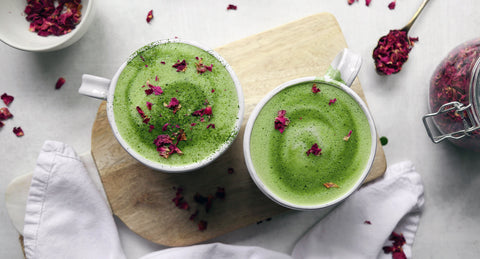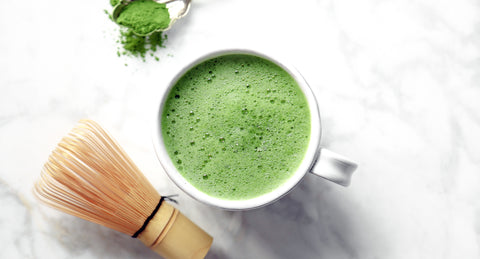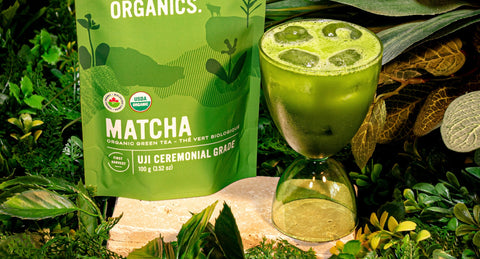Matcha, the finely ground powder made from specially grown and processed green tea leaves, has garnered widespread acclaim for its numerous health benefits. Rich in antioxidants, catechins, and a unique set of vitamins, matcha offers a potent mix of nutrients that contribute to overall well-being. In this post, we'll delve into the vitamins found in matcha, the typical amounts in a serving, and the potential health benefits each vitamin brings.
Understanding Matcha
Before we dive into the vitamins, it's essential to understand what makes matcha distinct. Unlike regular green tea, where leaves are steeped in water, matcha involves consuming the entire leaf, thus maximizing nutrient intake. The traditional preparation involves whisking matcha powder with hot water, creating a vibrant green beverage renowned for its smooth, rich flavor.
Vitamins Found in Matcha
- Vitamin A
- Vitamin C
- Vitamin E
- Vitamin K
- B-Complex Vitamins
Let's explore each vitamin in detail. Please note, the amounts per serving listed below are approximates and may vary based on matcha quality, grade and other variable factors.
Vitamin A
Amount Per Serving: Approximately 240 IU per gram of matcha.
Health Benefits:
- Vision: Vitamin A is crucial for maintaining healthy vision. It plays a role in preventing night blindness and age-related macular degeneration.
- Immune Function: This vitamin supports the immune system by promoting the production and function of white blood cells.
- Skin Health: Vitamin A helps maintain healthy skin and mucous membranes, which act as barriers to bacteria and viruses.
Vitamin C
Amount Per Serving: Approximately 3 mg per gram of matcha.
Health Benefits:
- Antioxidant Properties: Vitamin C is a powerful antioxidant that protects the body against free radicals and oxidative stress, potentially reducing the risk of chronic diseases.
- Immune Support: It enhances the immune system, helping the body ward off infections and illnesses.
- Skin Health: Vitamin C promotes collagen production, essential for skin elasticity and wound healing.
Vitamin E
Amount Per Serving: Approximately 1 mg per gram of matcha.
Health Benefits:
- Antioxidant Defense: Vitamin E works alongside vitamin C to combat oxidative stress, protecting cells from damage.
- Skin Health: It supports skin health by reducing inflammation and aiding in skin repair.
- Heart Health: Vitamin E helps maintain healthy blood vessels and may reduce the risk of heart disease by preventing the oxidation of LDL cholesterol.
Vitamin K
Amount Per Serving: Approximately 30 mcg per gram of matcha.
Health Benefits:
- Blood Clotting: Vitamin K is essential for blood clotting, helping prevent excessive bleeding.
- Bone Health: It plays a role in maintaining strong bones by regulating calcium deposition and improving bone density.
B-Complex Vitamins
Matcha contains several B vitamins, including B1 (thiamine), B2 (riboflavin), B3 (niacin), B6 (pyridoxine), and B12 (cobalamin).
Amounts Per Serving:
- B1: 0.02 mg per gram
- B2: 0.2 mg per gram
- B3: 0.6 mg per gram
- B6: 0.02 mg per gram
- B12: Trace amounts
Health Benefits:
- Energy Production: B vitamins are vital for converting food into energy, supporting metabolism.
- Nervous System Health: These vitamins help maintain the nervous system, reducing the risk of neurological disorders.
- Cardiovascular Health: B vitamins, particularly B6 and B12, help reduce homocysteine levels, a risk factor for heart disease.
Minerals in Matcha
Matcha's nutritional value doesn't stop at vitamins! Matcha powder is also a rich source of essential minerals:
- Calcium: Approx. 4-6 mg per gram of matcha.
- Iron: Approx. 0.17 mg per gram of matcha.
- Potassium: Approx. 27 mg per gram of matcha.
- Magnesium: Approx. 2.3 mg per gram of matcha.
- Phosphorus: Approx. 3 mg per gram of matcha.
Incorporating Matcha into Your Diet
Given the rich vitamin profile of matcha, incorporating it into your daily diet can be a boon for your health. Here are a few ideas:
- Matcha Tea: The traditional way of consuming matcha, simply whisk the powder with hot water.
- Matcha Latte: Mix matcha with milk (or a dairy-free alternative) for a creamy matcha latte.
- Smoothies: Add a teaspoon of matcha to your favorite smoothie for a nutrient boost.
- Baking: Incorporate matcha into baked goods like muffins, cakes, or bread.
Conclusion
Matcha is more than just a trendy beverage; it's a nutritional powerhouse packed with essential vitamins that offer numerous health benefits. By including matcha in your diet, you can take advantage of its vitamin-rich profile, supporting everything from your immune system to skin health. Whether you're sipping it in a tea or blending it into a smoothie, matcha provides a simple and delicious way to enhance your nutrient intake.



